Music is increasingly moving beyond the walls of traditional concert halls and entering the most unexpected urban spaces. In Portugal, festivals held by the water—on riverbanks, canals, and oceanfronts—are gaining exceptional popularity. These events not only create a unique atmosphere but also influence the development of the urban music scene. They unite different genres, generations, and formats, making music a part of everyday city life. Let’s explore how water festivals are transforming the cultural landscape and reshaping the perception of musical art.
A New Rhythm by the Water: Music, Waves, and Crowd Energy
Waterfront music festivals are becoming an integral part of the urban landscape in Portugal. They take place along rivers, ocean coasts, or even on floating platforms, blending music, nature, and urban culture into a single experience. These events are transforming not only youth leisure but also the very approach to concert organization, creating a unique musical environment where water becomes a full-fledged participant in the performance.
Unlike traditional venues, water festivals produce the effect of a “natural amphitheater,” where sound softly reflects off the water surface, enhancing acoustic perception. Music sounds different here: closer, livelier, freer. This impacts not only the audience but also the artists themselves, inspiring them to deliver more experimental and emotional performances. It’s often at such festivals where audiences hear the first live renditions of new tracks, spontaneous improvisations, and unexpected musical collaborations.
Rethinking the Urban Stage
Many Portuguese cities—such as Porto, Aveiro, and Setúbal—have already integrated water festivals into their cultural planning. This helps revitalize waterfront districts and attract tourists to non-tourist neighborhoods, expanding the geography of urban art. Instead of familiar halls and clubs, music takes to the promenades, piers, and boats, blurring the boundaries between stage and audience.
Festivalgoers often say they feel true freedom at these events—not just in movement, but in the way they experience music. Fresh air, the sparkle of water, and the absence of strict boundaries create an atmosphere that invites people to stay longer and engage more deeply with the music. This leads to the formation of new listening habits: more attention to live sound, interest in local performers, and a desire to return not for a specific act, but for the atmosphere of the festival itself.
Blending Genres and Audiences
Water festivals often bring together various musical styles on a single stage. Electronic music at sunset gives way to an acoustic concert under the stars, and jazz flows smoothly into indie rock. This creates the conditions for mixing audiences that would not usually interact. Young fans of techno might discover fado in a modern arrangement, while alternative music lovers might encounter local DJs for the first time.
This openness fosters new trends and directions in music culture. Many emerging bands receive their first recognition thanks to waterfront festivals, where the audience embraces experimentation with more enthusiasm than at commercial concerts. Producers and music critics have long monitored such events as a source of fresh ideas and new stars.
Digital Broadcasts and Online Entertainment
Modern water festivals are no longer confined to physical space. Many are broadcast online, featuring live streams, AR effects, and even NFT tickets. This broadens access and allows participation even for those who can’t attend in person. Moreover, these broadcasts have become a full part of cultural consumption alongside other digital formats—such as Casinos e Apostas and various streaming services—which also offer users a mix of emotions and immersive presence.
The shift to a hybrid format makes music events more accessible and democratic. Residents of Lisbon, Porto, or Faro can watch performances happening on the other side of the country and even influence setlists through apps or social media. This creates a sense of unity and a shared musical environment not bound by geography.
Sustainability and New Ethics
As the popularity of water festivals grows, so does the attention to ecological issues. Organizers increasingly opt for sustainable formats: using solar panels, implementing waste sorting systems, and inviting eco-activists. Much attention is paid to water cleanliness and respectful treatment of natural landscapes.
The audience is changing too. Many come not only for the music but also to take part in volunteer initiatives like beach cleanups or planting trees along the waterfront. Thus, the festival becomes not just a recreational space, but a tool for shaping a new civic culture.
Conclusion: Water as a Catalyst for Cultural Transformation
Water music festivals are more than just music set against a scenic backdrop. They are catalysts for urban transformation, laboratories of new genres, spaces for free interaction, and a point where the digital and physical worlds intersect. They encourage a rethinking of conventional cultural consumption and make music feel alive, emotional, and collective again.
With its rich coastal geography and passion for sound, Portugal is becoming an ideal platform for developing this format. In the coming years, we will witness how these festivals shape new generations of musicians and listeners, paving the way for a musical culture where nature, technology, and art exist in perfect harmony.
